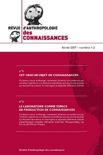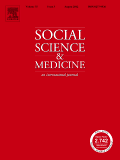
Anthropologie et Sante-Revue Internationale Francophone d Anthropologie de la Sante
Scope & Guideline
Innovating Insights into Health and Society
Introduction
Aims and Scopes
- Cultural Anthropology of Health:
This area investigates how cultural beliefs, practices, and social structures influence health behaviors and perceptions, emphasizing the need for context-specific approaches in health care. - Digital Health and Technology Integration:
The journal explores the implications of digital technologies in health care, including how these tools transform patient-provider relationships and care practices, particularly in a connected world. - Social Determinants of Health:
Research often focuses on the socio-economic and political factors that shape health outcomes, particularly for marginalized communities, linking issues of migration, race, and health. - Ethnographic Methodologies:
The journal promotes innovative ethnographic methods to study health practices and policies, providing rich qualitative data that highlight lived experiences and systemic challenges. - Health Policy and Governance:
This area examines the intersections of health policy, governance, and community engagement, analyzing how policies affect health access and equity.
Trending and Emerging
- Digital Health Innovations:
There is a growing focus on how digital tools and technologies are reshaping health care delivery, patient engagement, and the overall health landscape, especially in light of the COVID-19 pandemic. - Migration and Health Intersections:
Research is increasingly addressing the health implications of migration, exploring how migration affects health access, exploitation, and the integration of diverse health practices. - Community-Based Health Initiatives:
Emerging themes emphasize community involvement and participatory research approaches, particularly in response to public health challenges like pandemics, highlighting the role of local knowledge. - Ethnographies of Crisis:
There is a notable trend towards ethnographic studies that examine health crises, such as COVID-19, focusing on how communities navigate and respond to these challenges. - Health Data and Surveillance Technologies:
The journal is increasingly publishing on the themes of health datafication and the use of surveillance technologies, scrutinizing their impact on health policy and individual privacy.
Declining or Waning
- Traditional Medical Practices and Ethnobotany:
There has been a noticeable decrease in publications focusing on traditional medicine and ethnobotanical studies, perhaps indicating a shift towards more contemporary health issues and technologies. - Historical Perspectives on Health:
Research that delves into historical analyses of health practices and systems has diminished, potentially overshadowed by urgent contemporary health crises and their anthropological implications. - Generalized Studies of Global Health:
Broad studies addressing global health without a specific cultural or contextual lens appear less frequently, suggesting a move towards more localized and specific inquiries. - Philosophical and Ethical Discussions:
There seems to be a reduction in papers that focus solely on philosophical or ethical considerations in health, possibly as empirical studies gain more traction in the field. - Environmental Health Narratives:
Although environmental health remains important, the specific narrative-driven studies related to environmental health crises have seen a decline, possibly due to the shift towards more data-driven analyses.
Similar Journals

Revue d Anthropologie des Connaissances
Connecting Ideas, Cultures, and Disciplines.Revue d Anthropologie des Connaissances, published by the Société d'Anthropologie des Connaissances in France, serves as a vital platform for interdisciplinary exploration within the fields of anthropology, education, history and philosophy of science, and sociology. With an ISSN of 1760-5393 and adhering to an Open Access model since 2007, the journal aims to democratize knowledge and foster scholarly exchange among researchers, professionals, and students alike. Although it has been categorized as Q4 in 2023 across various disciplines, its contributions to the academics remain significant, encouraging innovative theorization and empirical studies on the interplay between knowledge and societal constructs. Researchers who engage with its diverse content not only gain insights into contemporary issues in anthropology and social sciences but also benefit from its unique perspective on educational practices and philosophical discourses. The journal's past coverage in Scopus reflects its evolving role in shaping understanding within its areas of focus.

SOCIAL SCIENCE & MEDICINE
Advancing Interdisciplinary Insights for Better HealthSOCIAL SCIENCE & MEDICINE, published by Pergamon-Elsevier Science Ltd, is a premier international journal dedicated to advancing knowledge in the interconnected realms of social sciences and medicine. With an impressive impact factor and categorized in the Q1 quartile across Health (social science), History and Philosophy of Science, and Miscellaneous Medicine, this journal is instrumental for researchers and practitioners striving to understand the social dynamics impacting health and well-being. Since its inception in 1967, the journal has maintained rigorous scholarly standards, providing a platform for innovative research, critical reviews, and interdisciplinary collaboration. By focusing on the socio-political determinants of health, it serves as a valuable resource for academics, professionals, and students alike, fostering a holistic understanding of health-related issues in contemporary society. Access options are tailored for a wide audience, ensuring the dissemination of essential findings and insights to aid in policy-making, healthcare practice, and public health initiatives.

Visual Studies
Connecting disciplines to enrich visual studies.Visual Studies, published by Taylor & Francis Ltd, is a leading international journal that serves as a vital platform for interdisciplinary scholarship in the fields of visual arts, cultural studies, and anthropology. Established in 2002 and continuing strong through 2024, it holds impressive rankings including Q1 in Cultural Studies and Visual Arts and Performing Arts, as well as Q2 in Anthropology, reflecting its significant impact and prestige within these disciplines. With a robust Scopus ranking placing it in the 89th percentile for Visual Arts and Performing Arts, this journal does not only publish original research but also fosters rich dialogues on visual culture, representation, and critical theory. Although it is not open access, researchers, practitioners, and students alike can benefit from its rigorous peer-reviewed content, which contributes to advancing knowledge and understanding of visual phenomena. Located in the United Kingdom, Visual Studies continues to shape the conversations surrounding visual practices and their societal implications.

Disparidades-Revista de Antropologia
Advancing knowledge on socio-cultural disparities.Disparidades-Revista de Antropologia, published by CONSEJO SUPERIOR INVESTIGACIONES CIENTIFICAS-CSIC, has established itself as a vital platform for scholarly discourse within the fields of anthropology, cultural studies, and linguistics since its inception. With an Open Access policy introduced in 1996, this Spanish journal ensures that critical research is accessible to a global audience, fostering interdisciplinary dialogue and knowledge sharing. Residing in the culturally rich environment of Madrid, Spain, the journal's recent categorizations within the Q4 in Anthropology, Q3 in Cultural Studies, and Q3 in Linguistics and Language indicate its growing influence in these areas, even as its Scopus rankings reflect the ongoing challenges in enhancing its visibility and impact. Aimed at researchers, professionals, and students alike, Disparidades champions innovative approaches and diverse perspectives, making a significant contribution to the understanding of socio-cultural disparities in contemporary society. By providing an accessible forum for academic research, it plays a crucial role in advancing knowledge and scholarship across multiple disciplines.

SSM-Qualitative Research in Health
Fostering interdisciplinary dialogue in health research.SSM-Qualitative Research in Health, published by Elsevier, is an innovative open-access journal dedicated to advancing the field of qualitative research within health and social sciences. With an ISSN of 2667-3215 and an E-ISSN of the same number, this journal has quickly established itself since its inception in 2021, achieving a commendable Q2 ranking in Health (Social Science) and a Q1 ranking in Social Sciences (Miscellaneous) by 2023. Located in the United Kingdom with its publishing office in Amsterdam, the journal aims to provide a platform for researchers, professionals, and students to explore and publish impactful qualitative studies that address the complexities of health issues through rich narrative and contextual understanding. With a focus on fostering interdisciplinary dialogue and innovation, SSM-Qualitative Research in Health is positioned as an essential resource for those seeking to deepen their insights and contribute meaningfully to the conversation surrounding health and social science research.

Visual Ethnography
Connecting Visual Culture and Ethnographic InquiryVisual Ethnography, published by UNIV BASILICATA, is an innovative academic journal dedicated to the interdisciplinary exploration of visual methodologies within the realms of Anthropology, Communication, and Cultural Studies. With a notable emphasis on visual ethnographic practices, this journal serves as an essential platform for researchers, professionals, and students aiming to bridge the gap between visual representation and cultural analysis. Since its inception in 2012, Visual Ethnography has contributed significantly to the academic discourse, despite its current positioning in the lower quartiles of its field as evidenced by its Scopus rankings. The journal actively engages its audience by providing open access options, ensuring that scholarship in visual culture is available to a wider community. With the academic landscape continually evolving, Visual Ethnography remains a vital resource for those seeking to understand the complexities of culture through a visual lens in the context of today’s globalized society.

Annals of Anthropological Practice
Pioneering Research for a Deeper Cultural ConnectionAnnals of Anthropological Practice, ISSN 2153-957X, an esteemed journal published by Wiley, serves as a vital platform for disseminating pioneering anthropological research and practices. Established in 2011, this journal has swiftly climbed the ranks, achieving a remarkable Q1 categorization in Anthropology and placing within the top 75th percentile according to Scopus rankings, firmly asserting its significance in the field. With a strong emphasis on innovative methodologies and real-world applications, Annals of Anthropological Practice showcases critical dialogues and insights that enhance our understanding of human societies and cultures. As an essential resource for researchers, professionals, and students, this journal invites contributions that intersect theoretical foundations with practical implications, fostering a rich exchange of knowledge pertinent to contemporary anthropological challenges.

Anthropology & Medicine
Innovating the Dialogue Between Anthropology and Medicine.Anthropology & Medicine, published by Routledge Journals, Taylor & Francis Ltd, represents a vital intersection of social sciences and health research, providing a platform for innovative scholarship in the field of anthropology and its implications for medicine. With an esteemed 2023 Scopus ranking placing it in the top tiers of anthropology and arts and humanities, this journal fosters critical dialogue between anthropological insights and medical practice, addressing pressing health issues through ethnographic lenses. The journal’s scope includes the exploration of cultural practices, health inequalities, and the social determinants of health, making it essential reading for researchers, professionals, and students dedicated to understanding the complexities of human health in diverse contexts. Although not an open access publication, its rigorous academic standards and impactful research contributions underscore its importance within both anthropology and medical fields, as reflected in its impressive category quartiles and its convergence from 1997 to 2024. Engaging with this journal positions scholars at the forefront of discussions shaping the future of healthcare and anthropology.

Primary Health Care Research and Development
Connecting researchers and policymakers for a healthier future.Primary Health Care Research and Development is an esteemed peer-reviewed journal published by Cambridge University Press, dedicated to advancing the field of primary health care. With a focus on innovative research and development, this journal covers a wide range of topics including care planning and public health, as illustrated by its current Q2 quartile rankings in Care Planning and Public Health, Environmental and Occupational Health for 2023. The journal, which has embraced Open Access publication since 2019, strives to ensure that critical research findings are accessible to a global audience, facilitating knowledge exchange among researchers, practitioners, and policymakers. Operating from its base in the United Kingdom, Primary Health Care Research and Development not only serves as a platform for rigorous scholarly articles but also aims to influence practice and improve health care delivery worldwide, making it an essential resource for those invested in the future of primary health care.

CULTURE & PSYCHOLOGY
Advancing Insights into Cultural PsychologyCULTURE & PSYCHOLOGY is a premier journal published by SAGE PUBLICATIONS LTD, dedicated to advancing the understanding of psychological processes within cultural contexts. With an ISSN of 1354-067X, this influential journal has been a cornerstone in the fields of Anthropology, Cultural Studies, Social Psychology, and Sociology since its inception in 1995. Notably, it holds prestigious Q1 rankings in both Anthropology and Cultural Studies, reflecting its high impact and substantial contribution to these disciplines. With a strong emphasis on interdisciplinary research, it invites rigorous empirical studies, theoretical discussions, and cross-cultural analyses that illuminate the interplay between culture and psychological phenomena. Readers can explore valuable insights without open access barriers, benefiting from a wealth of knowledge attested by its 2023 Scopus percentile rankings, ranging from the 40th to the 89th percentile in its respective categories. As such, CULTURE & PSYCHOLOGY remains an essential resource for researchers, professionals, and students eager to deepen their understanding in this dynamic and evolving field.